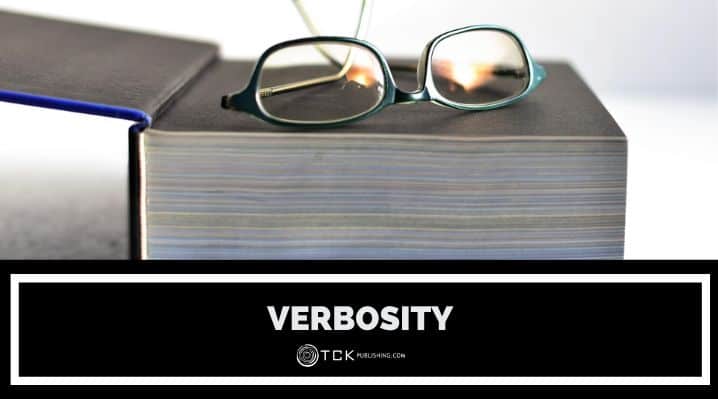
Verbosity is the enemy of clear writing. Whether you’re writing fiction, nonfiction, or professional content, too many words can get in the way. It clutters your sentences, weakens your message, and frustrates your readers.
What Is Verbosity?
Verbosity is the use of too many words to express a simple idea. Instead of getting to the point, wordy writing adds unnecessary phrases, weak modifiers, and filler words.
For example:
- Verbose: “Due to the fact that he was tired, he decided to go home early.”
- Concise: “Since he was tired, he went home early.”
The meaning stays the same, but the second version is clearer and easier to read.
Verbose writing often happens when you try to sound formal, intelligent, or poetic. But clarity should always come first.
How Verbosity Affects Your Writing
Verbose writing weakens any type of content. It creates three major problems: cluttered sentences that force readers to work harder, reduced impact that weakens your message, and lower engagement that causes readers to lose interest. If you want your writing to be effective, clarity must always be your priority.
In fiction, too many words slow down the pacing, make dialogue feel unnatural, and lessen emotional impact. A sentence like “She hesitated briefly for a moment before she finally spoke, her voice barely above a whisper” drags the moment out unnecessarily. A tighter version—“She hesitated before whispering”—preserves the meaning while improving flow and readability.
In nonfiction, verbosity makes information harder to absorb. Readers expect clarity, and excess words can bury key points. A sentence like “In today’s society, it is often the case that individuals find themselves in situations where they need to make decisions that could impact their future outcomes” is needlessly long. A clearer version—“People often face decisions that shape their future”—gets straight to the point and keeps readers engaged.
Why Writers Struggle with Verbosity
Many writers fall into the trap of verbosity without realizing it. There are several reasons this happens:
- Fear of sounding too simple—Some believe that longer, more complex sentences make writing seem smarter. In reality, clarity is what makes writing strong.
- Trying to hit a word count—In academic or professional writing, there’s often pressure to meet a specific length, leading to unnecessary padding.
- Over-explaining for clarity—Writers sometimes add extra words to ensure the reader fully understands a point, even when the meaning is already clear.
- Writing the way we speak—Natural speech includes filler words, redundancies, and extra phrases that don’t translate well to strong writing.
Recognizing these habits is the first step toward cutting unnecessary words.
How to Reduce or Eliminate Verbosity
Here’s how you can reduce wordiness and let your meaning shine.
Be Ruthless with Editing
Cut words that don’t add value. Every sentence should serve a purpose. Challenge yourself to express ideas in fewer words by limiting sentence or paragraph length.
- Verbose: “It is important to note that in order to write well, one must ensure that clarity is maintained in each and every sentence.”
- Concise: “To write well, ensure clarity in every sentence.”
Use Stronger, More Precise Words
Strong verbs eliminate the need for extra words. Practice paraphrasing. Take a paragraph and rewrite it using half the words while keeping the meaning intact.
- Verbose: “She spoke in a very soft and quiet voice.”
- Concise: “She whispered.”
Cut Unnecessary Modifiers and Qualifiers
Words like really, very, actually, in order to, due to the fact that often add nothing. Remove them.
- Verbose: “He was really tired and very exhausted after the long, long day at work.”
- Concise: “He was exhausted after a long day at work.”
Read Aloud and Revise
If a sentence sounds awkward or drags, tighten it up.
- Verbose: “Upon reviewing my writing, I came to the realization that it was not as concise as I had initially intended.”
- Concise: “I realized my writing wasn’t as concise as intended.”
Write with the Reader in Mind
Keep your writing clear and direct. Avoid over-explaining concepts your audience already understands.
- Verbose: “For those of you who may not be familiar with the concept of email marketing, it is essentially a way to communicate with customers through digital messages that are sent directly to their inbox.”
- Concise: “Email marketing is a way to reach customers through direct digital messages.”
Conclusion
Verbosity weakens your writing, no matter the format. The best writing isn’t the most complex—it’s the most effective.
Trimming unnecessary words will make your work clearer, stronger, and more engaging. The key is to prioritize clarity without sacrificing meaning. Start small. Over time, concise writing will become second nature.
How do you remove verbosity from your writing? Share your thoughts below!
If you enjoyed this post, then you might also like:
- Precis Writing: Do’s and Don’ts for Concise Summaries
- 9 Writing Maxims to Embrace or Reject
- 8 Tips for Concise Writing: How to Write Clearly and Effectively
- How to Fix or Avoid Passive Voice

Cole is a blog writer and aspiring novelist. He has a degree in Communications and is an advocate of media and information literacy and responsible media practices. Aside from his interest in technology, crafts, and food, he’s also your typical science fiction and fantasy junkie, spending most of his free time reading through an ever-growing to-be-read list. It’s either that or procrastinating over actually writing his book. Wish him luck!
